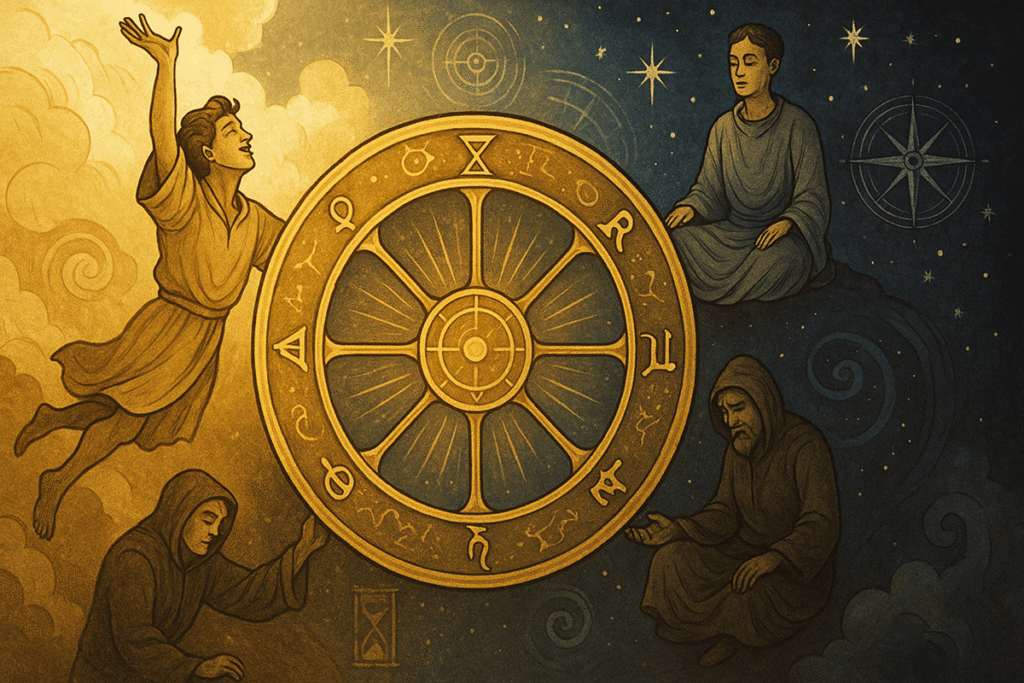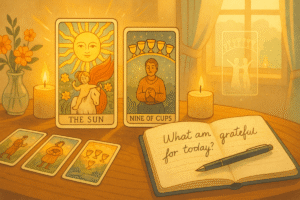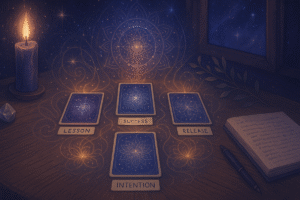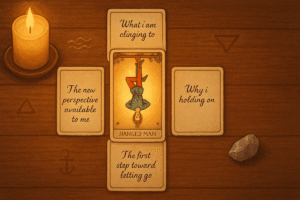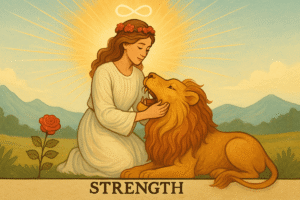Table of Contents
The Wheel of Fortune card has always struck me as one of the most honest cards in the tarot deck. Perhaps it’s because it doesn’t try to sugarcoat reality or promise easy answers. Instead, it presents us with a simple truth that we all know but sometimes forget: life moves in cycles, and change is the only constant.
When I first encountered this card years ago, I remember feeling slightly unsettled by it. There’s something both comforting and unnerving about the idea that we’re all passengers on this great wheel of existence, sometimes riding high, sometimes finding ourselves at the bottom. But over time, I’ve come to appreciate the profound wisdom embedded in this ancient symbol.
Understanding the Wheel’s Movement
The Wheel of Fortune invites us to step back and observe the larger patterns in our lives. Think about your own experiences for a moment. Can you identify periods when everything seemed to flow effortlessly? Times when opportunities appeared around every corner, when relationships flourished, when your energy felt boundless?
Now consider the opposite moments. Those stretches when challenges seemed to pile up, when doors kept closing, when you felt like you were swimming against an invisible current. If you’re honest with yourself, you’ll probably notice that these phases didn’t last forever, did they?
This observation might seem obvious, but I think we often lose sight of it when we’re in the thick of either extreme. When we’re riding high, we sometimes believe we’ve finally “figured it out” and that our success is purely the result of our own efforts. When we’re struggling, we might convince ourselves that this is just how life is now, forgetting that we’ve weathered difficult periods before.
The wheel reminds us that both perspectives are incomplete. Our successes often involve elements beyond our direct control, just as our challenges don’t necessarily reflect personal failures.
Reflecting on Your Position
Where do you find yourself right now on your personal wheel? This isn’t about making predictions or determining your fate. Rather, it’s an invitation to honestly assess your current circumstances with a sense of perspective.
Maybe you’re in an upswing. Projects are succeeding, relationships feel solid, health is good. If so, how are you handling this period? Are you using this time to prepare for future challenges, or are you taking your good fortune for granted? There’s no judgment here, just curiosity about your own patterns.
Perhaps you’re in a more difficult phase. Work feels stagnant, personal relationships are strained, or you’re dealing with health concerns. What does this position on the wheel teach you about your own resilience? How have you navigated similar periods in the past?
I’ve noticed that people often resist this kind of reflection. We want to believe we have more control than we actually do. But there’s something liberating about acknowledging the role of circumstance and timing in our lives. It doesn’t diminish our agency; it simply places it in a more realistic context.
The Wisdom of Acceptance
The Wheel of Fortune doesn’t advocate for passive resignation. Instead, it suggests a more nuanced approach to life’s inevitable changes. When we’re ascending on the wheel, we can appreciate our good fortune while remaining humble about our role in creating it. When we’re descending, we can face challenges with the knowledge that this too shall pass.
This perspective has helped me personally during some of my more difficult periods. I remember a stretch about five years ago when everything seemed to be falling apart simultaneously. My natural inclination was to fight against these circumstances, to exhaust myself trying to force things back to how they were before.
The wheel’s wisdom suggested a different approach. What if, instead of resisting the downward motion, I used this time to reassess what truly mattered to me? What if I viewed this period not as a failure but as a necessary part of a larger cycle?
This shift in thinking didn’t magically solve my problems, but it did change how I related to them. I found myself asking different questions. Instead of “Why is this happening to me?” I began wondering “What might this situation be teaching me?” The circumstances remained challenging, but my relationship to them became more workable.
Finding Balance in Motion
One of the most intriguing aspects of the Wheel of Fortune is that it’s always moving. Even when we feel stuck, even when it seems like nothing is changing, the wheel continues its slow rotation. This constant motion suggests that balance isn’t a static state we achieve once and then maintain. It’s something we must continually recalibrate as circumstances shift.
Think about how this applies to your daily life. On good days, how do you stay grounded and grateful? On difficult days, how do you maintain hope and perspective? These aren’t philosophical questions; they’re practical ones that can shape how we navigate our actual experiences.
I’ve found that developing small daily practices helps me stay connected to this sense of ongoing motion. Maybe it’s taking a few minutes each morning to acknowledge both the challenges and opportunities in my life. Perhaps it’s keeping a simple journal where I note the small changes I observe each day. These practices don’t control the wheel’s movement, but they help me stay aware of it.
Embracing Uncertainty as a Teacher
The wheel also invites us to consider our relationship with uncertainty. Most of us prefer predictability, and there’s nothing wrong with that. But life rarely offers us the consistency we crave. Instead of viewing this unpredictability as a problem to be solved, what if we approached it as information to be processed?
When I’m facing an uncertain situation now, I try to ask myself what this particular form of uncertainty might be revealing. Sometimes it shows me how attached I’ve become to specific outcomes. Other times it highlights areas where I’ve been avoiding necessary changes. Occasionally, it simply reminds me that I’m human and that humans don’t actually know what’s coming next, despite our best efforts to plan and predict.
This doesn’t mean I’ve stopped making plans or setting goals. But it has changed how I hold those plans. They feel more like hypotheses now, subject to revision as new information becomes available.
The Wheel’s Invitation to Growth
Perhaps the most valuable insight the Wheel of Fortune offers is its invitation to growth through all phases of the cycle. When we’re ascending, we can cultivate gratitude and generosity. When we’re at the top, we can develop wisdom and prepare for changes ahead. When we’re descending, we can practice courage and resilience. When we’re at the bottom, we can discover what truly sustains us.
Each position on the wheel offers its own curriculum, its own opportunities for development. None of them are inherently better or worse than the others; they’re simply different. This perspective has helped me approach both my successes and my challenges with more curiosity and less judgment.
Living with the Wheel’s Rhythm
As I reflect on my own relationship with the Wheel of Fortune over the years, I realize it has become less of a card I consult for answers and more of a lens through which I view my experiences. It reminds me to stay humble during good times and hopeful during difficult ones. It encourages me to pay attention to the larger patterns in my life while remaining present to whatever is happening right now.
The wheel doesn’t promise that everything will always work out the way we want it to. But it does suggest that everything is always working, moving, changing. And perhaps that’s enough. Perhaps learning to dance with that movement, rather than trying to stop or control it, is one of the most valuable skills we can develop.
What does your own wheel look like right now? Where do you find yourself in your personal cycles of change and growth? These questions don’t require immediate answers, but they might be worth carrying with you as you move through your days, watching for the subtle signs of the wheel’s eternal turning.
Frequently Asked Questions
How can I tell which position I’m in on the wheel right now?
Rather than looking for external signs or trying to predict your position, pay attention to how you’re experiencing your current circumstances. Are you feeling expansive and grateful, or contracted and challenged? Your emotional state and how smoothly things are flowing in your life can offer clues. The key is honest self assessment without judgment, simply noticing where you are right now.
What should I do when I feel stuck at the bottom of the wheel?
When you’re in a difficult phase, resist the urge to force change or fight against your circumstances. Instead, use this time for reflection and reassessment. Ask yourself what patterns brought you here and what you might need to learn from this experience. Remember that the wheel is always turning, even when it feels motionless, and this phase is temporary.
Does the Wheel of Fortune mean I have no control over my life?
Not at all. While the wheel acknowledges that many factors affecting our lives are beyond our control, you still have complete agency over how you respond to circumstances. You can’t control whether the wheel turns or where it takes you, but you can control your attitude, your choices, and how you prepare during each phase of the cycle.
How do I stay balanced when life is going really well?
When you’re experiencing an upswing, practice gratitude and mindfulness about your good fortune. Use this favorable period to build reserves, whether that’s strengthening relationships, developing new skills, or simply creating positive memories. Avoid the trap of believing that your success is permanent or entirely self created. Staying humble and grounded helps you appreciate the present while preparing for inevitable changes.

